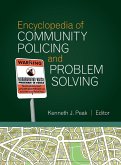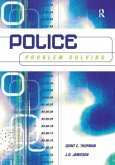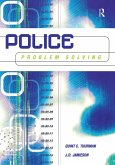Problem Solving Courts examines a relatively new approach to criminal justice in which judges, advised by law enforcement officers and mental health workers, meet with offenders on a weekly basis to talk about their issues in a socio-legal setting where therapeutic intervention is combined with a measure of punishment for program violations. Sociologist JoAnn Miller and judge Donald C. Johnson, creators of three successful problem solving courts themselves, address the compelling needs for alternatives to prisons, analyze problem solving courts in depth, and assess the impact problem solving courts can have on offenders and their communities.
Hinweis: Dieser Artikel kann nur an eine deutsche Lieferadresse ausgeliefert werden.
Hinweis: Dieser Artikel kann nur an eine deutsche Lieferadresse ausgeliefert werden.
Miller and Johnson's Problem Solving Courts is a fascinating introduction and examination of the possibilities and limitations of problem solving courts as 'blended institutions' that seek to reduce recidivism and protect the community by addressing offenders' underlying behavioral, socio-emotional, and human capital deficits. -- Jeffery Ulmer, Penn State University Problem solving courts (PSC) have exploded onto the criminal justice scene in the last twenty years...JoAnn Miller and Donald C. Johnson in Problem Solving Courts dig past recidivism studies by reporting their findings from a three-year institutional ethnographic study of three different types of PSCs...The important question they address is, why do some specialty courts seem to work better than others? Miller and Johnson's study helps us understand that the problems faced by PSCs are not just tough-to-reform defendants, but tough-to-reform agencies. Contemporary Sociology The authors present detailed case studies and research showing how the theater of law can provide alternatives to incarceration and end the tragic cycle of recidivism. Think Magazine, (Purdue University) This book is creative and fresh in its approach. The authors cover the length and breadth of socio-legal studies related to Problem Solving Courts. By including the voices of repeat offenders, classical social scientists, and cultural giants such as Shakespeare, they go far beyond the conventional. This book poses an intellectual challenge to students, legal practitioners, and social scientists to draw upon a breadth of perspectives in their conception of the justice process. The book provides a behind the scenes look at Problem Solving Courts, and is required reading for anyone interested in understanding contemporary jurisprudence. -- Glenn W. Muschert, Miami University "According to Miller, part of re-entry court's success was the enthusiasm of everyone involved-for instance, a doctorate student at Purde who was on the team started a reading program for the recently released prisoners" "Miller said she could count on one hand the number of participants who re-offended. And in those cases, they either violated probation or program rules or committed minor crimes, such as one man found intoxicated and asleep in his vehicle" Courier-Journal








